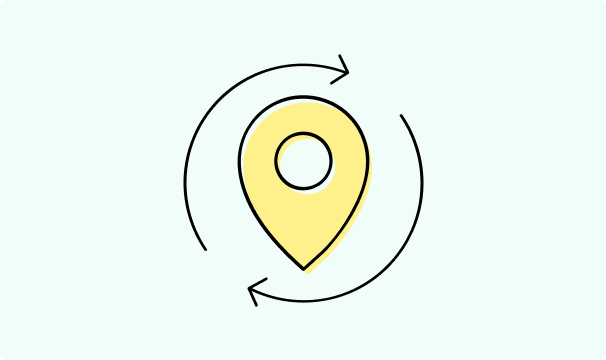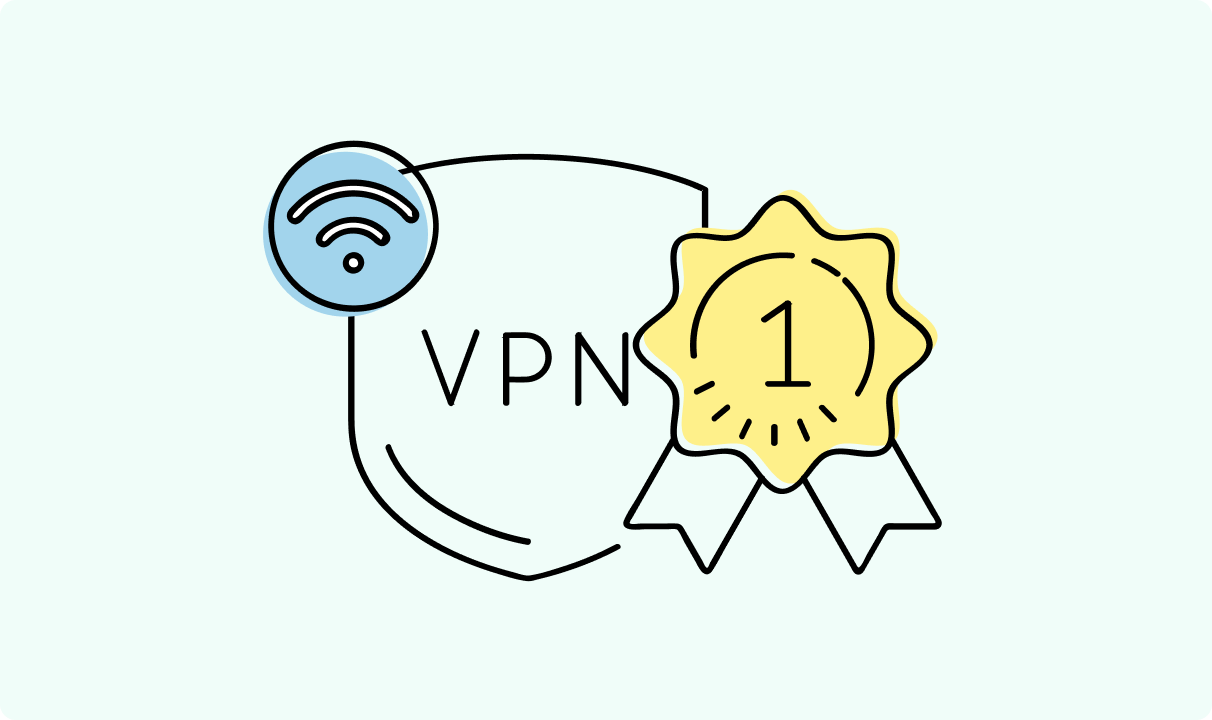How to Change VPN Location: A Step-by-Step Guide
Many people get a VPN (Virtual Private Network) app for one explicit reason – to be able to change their perceived IP address. Since lots of data, including geographical location, is tied to IP addresses, changing it through a VPN server will change your perceived locale as well.
While enhanced privacy is a great benefit you can get from changing IP addresses, picking the correct VPN server location will also let you view content that’s usually restricted to that country only.
There’s always more reasons one can have to change their IP address, however.

Rasa Sosnovskytė
5 min read

Why You Might Need to Change Your VPN Location
Accessing Geo-blocked Content
One of the primary reasons to change your IP address and VPN location (and why use a VPN at all). Since a predicted geographical location is tied to each IP address, switching it makes websites think the user comes from a new location.
Most geo-blocked content is restricted by the perceived IP location. So, changing the VPN location to a place where the content is available automatically makes it viewable. Some of the best expat VPN servers are tailored to access specific services that way.
Some websites may have more advanced detection algorithms than just IP location, but these are few and far between. In case you encounter them, there are other methods, such as changing your DNS server (see our DNS vs VPN comparison for more).
Enhancing Privacy and Security
Another reason to get a new IP address through a VPN server is to hide your tracks. Your IP address may be known to some websites, especially if you visit frequently. Additionally, any online activities are automatically tied to your IP address as well.
Getting a new one basically resets a major part of any tracking that may be being performed. As long as you don’t leak important information with your new IP address, the VPN server will make it seem as if a completely different person is performing the online actions.
If you change your IP address, but log in with the same account (or otherwise tie activities to identity), that won’t add a lot of privacy, however. You can still be detected through other means if you only change your IP address.
Bypassing Censorship
Another reason to use a VPN service is to bypass governmental or institutional restrictions. Most blocking that happens on a country or institution level is only possible if the traffic is routed through specific servers.
A VPN server first routes traffic to another server, allowing you to bypass censorship. As long as you pick the right VPN location, such restrictions won’t be a problem.
Do note, however, that many governments and institutions know that their censorship can be bypassed by using a VPN service. As such, those countries may have restrictions on how you can legally use a VPN service. Make sure to check are VPNs legal in your country by staying up-to-date with relevant laws.
Avoiding ISP Throttling
Like with censorship, there are ways to avoid various ISP throttling practices. Using a VPN server won’t help if your bandwidth is limited as they only scramble the data that’s being used up.
If your ISP, however, throttles based on website usage or through other similar means, a VPN service will encrypt all of that data. The ISP won’t be able to pick up exactly what you’re doing, so they won't be able to throttle you.
Finding Better Deals
There’s a rather niche use case for VPNs when traveling. Flight and accommodation prices are calculated based on numerous factors, including locations, previous purchase history and some other.
Switching up your VPN location can help you, sometimes, find slightly better prices for either flights or accommodation. Make sure to make such purchases carefully as other settings may be changed – you don’t want to get automatically switched to some other airport.
How to Change VPN Location: Step-by-Step Guide
Get a Reliable VPN Provider
If you don’t have a VPN provider at this point, find one that offers a reliable service. You’ll likely want to look at a few things at once:
- Supported devices.
- Number of locations.
- Price.
- Additional security and privacy features.
Many VPN providers focus on various additional security and privacy features, so a lot of the price comes from the research and development process. If all you need is a virtual location so that you can watch streaming services – look at the amount of offered VPN server locations and price.
For simplicity sake, we’ll be picking CometVPN for further steps throughout the guide.
Install the VPN App on Your Device
CometVPN is available on most devices, so all you need to do is register an account, purchase a subscription and download the associated app.
For mobile devices, the app will install automatically as you finish downloading it since it comes either from Google Play Store or the Apple App Store.
For Windows and other desktop machines, you’ll need to download the installer from the website and install it manually.
Once everything is set up, boot up the application and enter your login information.
Open the VPN App and Select a Server Location
If you’ve logged into the VPN app successfully, just a few steps remain. Under “Current Location” simply select the VPN server location you want to connect to. Then tap the large “Power” button.
Establishing a connection might take a few seconds, but once that’s completed, you don’t need to do anything else. You have a new IP address from the server location you’ve selected.
In case you want to get a new virtual location, simply select a new server location and ensure that the VPN app is turned on.
Test Your New Virtual Location
While everything should be working fine, you may want to use third-party tools to verify that the virtual private network is functioning as expected.
Usually, all you’ll need to do is visit a website like What is My IP Address to verify that it’s showing a different location and IP address.
Common Issues When Changing VPN Location and How to Fix Them
You can run into a few issues when you want to change your IP address through a VPN. Luckily, there’s usually not a lot to be done to fix those issues.
First, if there’s issues connecting to the VPN server itself, you may need to select another one with the same VPN server location. There may be congestion or other issues with one particular server, but others could be working fine.
If that doesn’t help and you find your VPN not connecting as it should, try restarting the entire app, relogging, and selecting the same VPN server location. Any issues that were happening on your device should be fixed with a simple restart.
Finally, if you notice performance degradation when using your VPN location changer, there could be several reasons. First, check that your own internet connection is performing as expected. Then, try picking a new server and, potentially, virtual location.
Doing both of these actions will ensure that any issues that can be solved on your end will be. There may be cases where a particular IP address or an entire pool is down for maintenance or for other reasons. In that case, you’ll just have to wait it out.
Can I choose any country with a VPN?
Yes, but you should always consider your needs. If you need to access geo-restricted content, you need an IP address from that particular country. If you need to bypass censorship, then change your IP address to one outside of the country that’s doing the censorship.
Why is my VPN not connecting to a specific country?
If there are no issues with your device or app, it’s likely that the VPN provider is performing maintenance on their servers. You may have to wait it out.
How can I check if my VPN location change is working?
You can visit a website that’s normally restricted to you and see if you can now view the content. On the other hand, websites that check your IP address also work perfectly fine.
Is changing VPN location legal?
In most countries, yes, using a VPN to change your location is legal. However, read up on local laws as there are some countries that restrict VPN usage entirely – using one to change your location would then be illegal.
Does changing my VPN location improve security?
A little bit. Most of the security comes from encryption and other measures, but simply changing your location and IP address makes it harder to track your online activities.

Author
Rasa Sosnovskytė
Chief Executive Officer at Growth Bite
Rasa is a well-known SEO expert and co-founder of Growth Bite, a digital marketing agency. She has previously worked with globally recognized brands such as NordVPN, Oxylabs, and many others.
Related articles

4 min read
Best Residential VPN Providers in 2025
A Virtual Private Network (VPN) encrypts your traffic and hides your IP address. The way these functions are accomplished affects various aspects of your online privacy and security.
Here, we'll consider using residential IP addresses instead of those originating from a data center. A residential VPN has advantages compared to traditional ones, but there are some caveats. It all boils down to residential VPN providers.
The worst ones may even create more risks than benefits. We'll end this article with a list of the best residential VPN providers on the market.

Guoda Šulcaitė
4 min read
Ethernet vs Wi-Fi: Which One is Better?
Ethernet and Wi-Fi are the two main ways to connect your computer to the internet. While Wi-Fi has received significantly more attention in recent years, especially among consumers, due to its simplicity and flexibility, ethernet is still widely used in various other applications.
Even if Wi-Fi is significantly more popular, it isn’t strictly better. Both methods have their benefits and drawbacks. Wi-Fi’s popularity comes from its ease-of-use and flexibility, but an ethernet connection can be much more useful in certain scenarios.

Adomas Šulcas

5 min read
How to Change Chrome Proxy Settings: The Ultimate Guide
A proxy server is an easy alternative to a VPN that can perform most of the functions of the latter. It’s a server that stands between your device and the destination server, taking your connection requests and forwarding them in your name.
Destination servers in almost all cases see the proxy server as the originator of the request. As such, proxies are widely used in various, mostly business-related applications whenever privacy, security, location changing, and several other factors are at play.

Guoda Šulcaitė